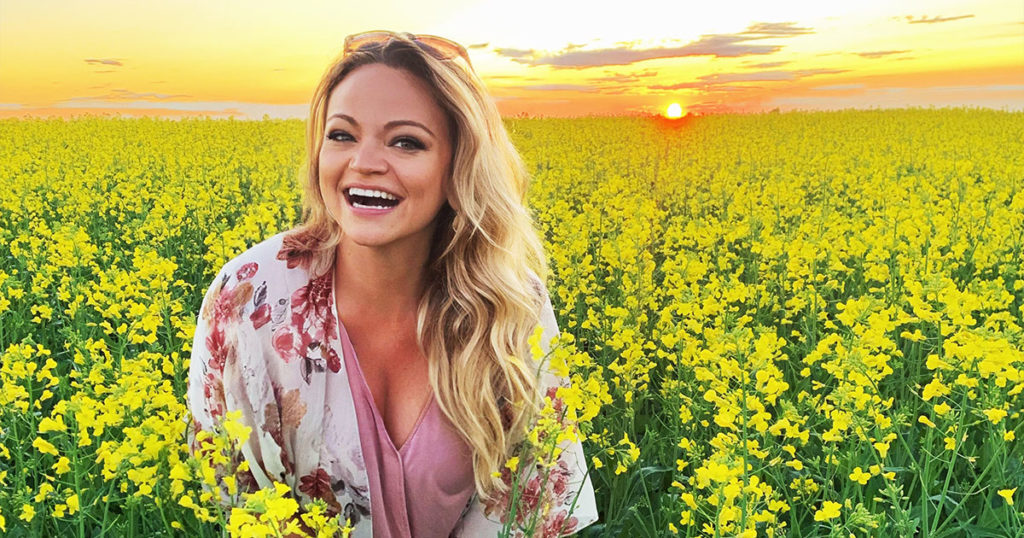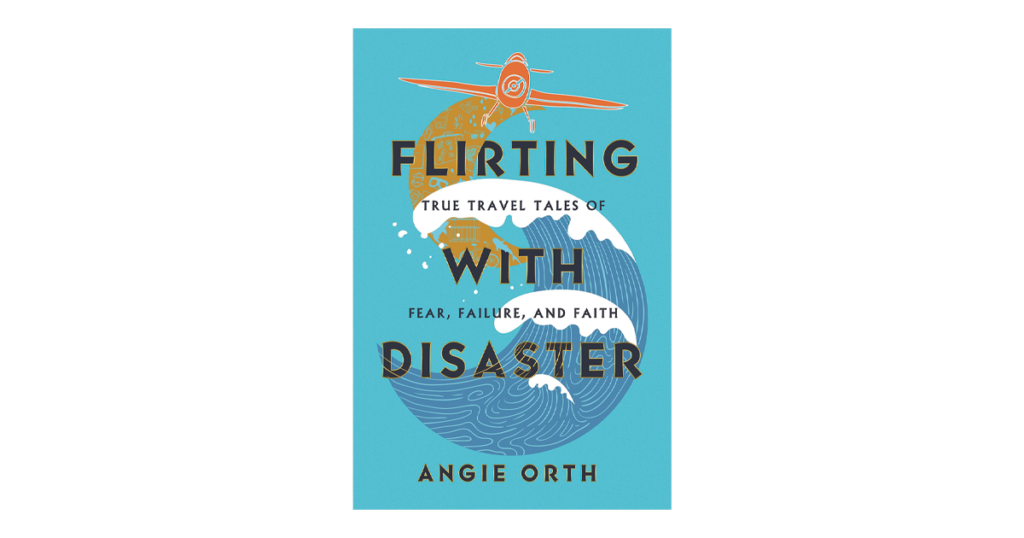Faith & Travel with Angie Orth: Insights from “Flirting with Disaster”
"I approach travel with a level of gratitude and wonder that comes along with my beliefs..."
Angie Orth is a writer and speaker best known for her travel and lifestyle website, Angie Away, and travel series “The Jet Sisters.” She’s a recovering PR agency publicist, former New Yorker, current Floridian, hesitant risk-taker, and allegedly, a grown-up. She’s covered travel for AFAR, Cosmopolitan, Buzzfeed, Lonely Planet, The Today Show and Destination America. With the recent release of her first book “Flirting with Disaster: True Travel Tales of Fear, Failure, and Faith” documenting the trials and triumphs of her first solo globe-trotting adventure, Angie sat with The War Cry to discuss her journey and the ins and outs of being a Christian travel influencer.
How would you say being a Christian impacts your work as a travel writer, and what sets you apart from non-Christian travel writers?
Everybody has their own story to tell. Whether they’re a travel writer or a Christian, or all of those things, or some of those things, everybody’s story is going to be different. I have a different perspective than a lot of the other travel writing that I’ve read. I see the world through a Christian perspective that there’s a Creator who made all these beautiful landscapes and diverse cultures, and so I approach travel with a level of gratitude and wonder that comes along with my beliefs. One example I think of is the Grand Canyon. It’s not just something to look at and say, “Okay, cool.” But it’s something that when I see it, I thank God for it. I’m in awe that He made it, and also that He knew one day I’d be standing there looking at it and appreciative of it. I don’t know if it’s crazy to think that God made this for me, but God knew where I was going to be and what was going to make me smile or gasp or have that wonder.
What are some of the challenges of going from blog posts to a full-length book?
Blogging and book writing are so vastly different. They’re such different kinds of storytelling that require such different skills. Blog posts are helpful. They answer a question, and they’re informational. Where do I stay in Greece? That’s what a blog post will cover. But the book has so much less of that, and it’s more the experience of traveling and the sensory experience of it. The sights, sounds and smells, and then the personal relationships and personal failings and triumphs. There’s some of that woven into my blog, but not nearly as much as in a book. I’ve been blogging since 2006, so I’ve had people reading my stuff since then, and I wanted even those people to get something new out of the book when they opened it. There’s stuff in the book that nobody ever knew. I wanted it to be a fresh experience, even for the longest reading fan.
There’s also more intimacy between myself and the reader with the book. The whole blogging world has changed so much since I started. There was no search engine optimization, there was no thinking about a reader’s intent. It was just, “Here’s what I did today.” No big deal. Now when I post something on my blog, it’s very seriously considered and crafted because I want it to fall into the right hands, and the only way that’s going to happen is if I do certain steps. With a book, it’s just a whole different mechanism and everything about it is different. It’s two totally different career paths, but with that common thread of storytelling.
The trip in your book happened more than 10 years ago. Why is now the time to tell this story? Why not sooner?
If I had my way, I would’ve written it as soon as I got back. I would’ve written 15 books by now and I would be Elizabeth Gilbert. I want everything to happen so much faster than it does, especially because publishing takes so long. I probably got really serious about writing the book and doing the whole publishing journey four years ago, but there was a pandemic, which completely destroyed my entire industry. Everybody said, ”Well, we may never travel again. Who needs a memoir? Who needs a book when you can’t even go anywhere?” I think if I learned anything, it’s that God’s timing is not my timing and God’s way, even if I don’t like it at the time, is always better than what I have in mind. There’s this hindsight that I have in all these years, and I have the perspective of being in my 40s now, instead of my 20s. The extra distance gave me the space and the knowledge to put weight on the important things for the book and leave some of the less important things behind.
Much of your trip did not go as planned. Looking back, would you have changed anything about it or the outcomes?
There are probably little decisions I would have tweaked, like maybe I would’ve kept my mouth closed when I was close to all the stuff that ended up making me sick. But I don’t really have any regrets about the year. If you can use a negative experience to help somebody else, then I think it was probably worth it.
How do you think your trip would’ve been different if you weren’t a Christian or had chosen not to rely on God during those more challenging moments?
It would be a very different book, wouldn’t it? I probably would have written a similar book to what’s already out there if I wrote one at all. I think it helped me to see that God is who He says He is. I’m glad that I had those experiences and that I had to kind of wrestle with my faith at times because on the other side of it, I’m like, “Oh, there was a plan.” He knew all along, and I’m glad I don’t have to find out what it would be like to not rely on God. It does make you look back and say, “Okay, He brought me through this, He brought me through that. Whatever is coming next, it will be okay.”
You mention various Scripture passages throughout the book. Do you have a particular life verse that stuck out to you during that year?
The one that always sticks with me is Esther, when it was for such a time as this, you don’t know what’s going on, but you’re where you’re supposed to be for a reason. She sticks with me a lot, especially when things are bad. I’ve seen life play out where yes, there was a reason for a tough situation and maybe it wasn’t just to help me or get me to a new place. Maybe it was about somebody else being in the right place or somebody else witnessing you go through it in a graceful way.
Do you think there was any quantifiable difference in your faith before and after the trip?
Yes, but I don’t know that I realized it immediately. If we’re doing this discipleship journey and we’re always being sanctified, our faith is always growing and always getting better. We’re always learning things, even though I’m consistently like, “Okay, I’ve got it figured it out now. I’m smart and I know everything, and I don’t need to grow anymore.” And then it turns out there’s always more to learn. As time passes, I can look back and see that girl, 29-year-old Angie, and just so many differences, but I am not sure that I necessarily saw them right when I got home.
What about the book are you most proud of?
I took a risk with this, and I was very vulnerable. I shared a lot of very private, very difficult moments, and that was very scary. That was all God saying, “Don’t hold back. You must tell the whole story if it’s going to impact people.” So, I did, and I was just hoping that it would be relatable to people. I’m proud that I really went for it, even though you do get criticism and you do get people who tell you off because you have beliefs. But I knew that was coming and I’m proud that I did that.
I’m also proud that I was able to write the book that I had in my heart because there’s not another book like it, from a Christian who is also a travel blogger, and it’s only because of God that I didn’t have to twist that to fit into one or the other. I didn’t have to leave Jesus out of it so it could be a travel book, and I didn’t have to leave travel out of it so it could be a faith book. That was a struggle in the early publishing journey because they’re like, “What are we supposed to do with this? What section does it go in? Is it a travel book or is it a faith book?” It’s both and there isn’t a section for that. The bookstores don’t know where to put me. My book is next to my pastor’s book, and, well, it’s not that kind of a book. But they’re also like, “I don’t know, it’s not really travel.” In publishing and marketing, it’s hard to convince anybody to do anything that’s not by the book, truly in the little box, which is so funny because that’s basically what the whole book is about: people don’t need to be in a box. So, I feel very proud that I got to write the book that I wanted.

What do you hope that readers get out of your book? If they could only walk away with one thing, what would you want it to be?
I had two goals for the book. One was to make people laugh, and I think I’ve done that, and the other was to make people who either grew up like me or had similar experiences to feel less alone in their struggles, confusion and questions with God. I’ve gotten a lot of letters and messages, and they just constantly make me cry. People are saying, “So relatable,” and “I had the same questions as a kid,” and “I dealt with the same kind of pastor.” There’s just so much stuff that we don’t necessarily get to talk about openly, and I just wanted other women like me to be able to relate.
What advice would you give to all the other young adults who are dreaming of going on this kind of journey of self-discovery?
I still feel like I have no business giving anyone advice because I’m figuring it out myself, but I think God made all of us with unique talents and quirks and desires, and that’s not so you can get stuck doing what everyone else thinks you’re supposed to do. Weigh the expectations early on. Don’t just take them as gospel, because a lot of expectations are twisted gospel and cultural and not Christian at all. So, make sure you’re questioning limiting beliefs and then line it up with what the Word says, and then walk in the freedom God has given us. He gives us freedom, not chains, to be different from everybody else in our church. In a church of 100 people, that’s 100 different life plans and desires. God made us different, and that’s a fact, so use it and don’t get stuck in the corner.
This article was originally titled “Faith on the Road” in the September 2024 issue of The War Cry.







